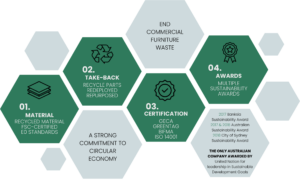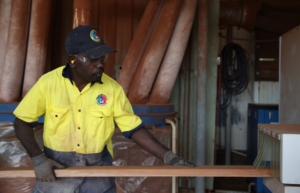In today’s world, sustainability is more than just a trend—it’s a responsibility. As awareness grows about the environmental impact of our choices, the demand for truly sustainable furniture has never been higher. But what does it actually mean for furniture to be sustainable? At Winya Indigenous Furniture, our approach to sustainability is informed by our Indigenous leadership and conservation of culture and country. Let’s break down the key criteria and standards that define what makes furniture truly eco-friendly.
Responsible Sourcing of Materials
Sustainable furniture begins with the careful selection of materials. At Winya, we prioritise responsibly sourced materials that do not deplete natural resources or harm ecosystems. Our commitment to sustainability is underpinned by our ISO9001 Quality and ISO14001 Sustainability certifications, ensuring that every step of our production process meets the highest standards. For example, the wood used in our furniture is sourced from certified sustainable forests, guaranteeing that biodiversity is preserved and reforestation is supported. Additionally, we exclusively use FSC-certified timbers, further ensuring that our sourcing practices are environmentally sound.
Use of Recycled and Upcycled Materials
Another hallmark of sustainable furniture is the use of recycled and upcycled materials. By repurposing materials that would otherwise end up in landfills, we reduce waste and conserve natural resources. Winya’s dedication to sustainability is further demonstrated through our takeback and recycling programmes, where we convert old desks and other materials into new furniture, such as lounges and ottomans. This initiative helps divert hundreds of tonnes of waste from landfills, reinforcing our commitment to a circular economy. For instance, desks from Commonwealth Bank have been transformed into ottomans and lounges now housed in the University of Melbourne.
Eco-Friendly Manufacturing Processes
Sustainability isn’t just about the materials used—it’s also about how the furniture is made. At Winya, our manufacturing processes are guided by our ISO14001 Sustainability practices, ensuring that we minimise energy consumption, reduce greenhouse gas emissions, and limit the use of harmful chemicals. We are proud that most of our seating options are AFRDI or BIFMA certified, guaranteeing maximum durability and a long lifespan, which are essential elements of sustainable furniture. Moreover, we manufacture locally within states to reduce the carbon footprint and emissions associated with freight, further contributing to our eco-friendly initiatives.
Longevity and Durability
A key aspect of sustainability is creating products that last. Furniture that is built to endure reduces the need for frequent replacements, thereby minimising waste. Winya’s products are designed for longevity, with certifications such as Greentick and Greentag ensuring that our seating and workstations meet rigorous sustainability and quality standards. By investing in durable, high-quality furniture, our clients not only benefit from long-term savings but also contribute to reducing environmental impact. Additionally, we hold GECA certification, and in terms of durability, our warranty extends to 10 years. Many of our items can be repaired in-house, thanks to our local manufacturing, ensuring they remain functional for years to come.
End-of-Life Considerations
Sustainable furniture considers what happens when its useful life comes to an end. At Winya, we design our products with end-of-life in mind, making it easy to disassemble, recycle, or responsibly dispose of them. Our takeback and recycling program for Australian-made task seating is a testament to our commitment to sustainability from start to finish, ensuring that our products have a minimal environmental footprint even after years of use.
Supporting Ethical Labor Practices
Sustainability is also about social responsibility. At Winya, we support ethical labor practices by working closely with Indigenous communities and local artisans. This not only ensures fair treatment and wages but also helps preserve cultural heritage. Our approach is holistic, encompassing both environmental stewardship and social equity, which are integral to truly sustainable furniture.
Transparency and Certification
Transparency is crucial when it comes to sustainability. Winya’s commitment to providing clear, verifiable information is reflected in our numerous certifications, including ISO9001, ISO14001, AFRDI, BIFMA, Greentick, and Greentag. These certifications assure our customers that our products meet the highest sustainability and quality standards. Our dedication to these principles has been recognised with multiple awards, including the Australian Sustainability Awards in 2017 and 2018, a prestigious Banksia Award for sustainability in 2017, and the United Nations award for Leadership in the Sustainable Development Goals (SDG) in 2018—the first and only such recognition for an Australian company.
Conclusion
Sustainable furniture is about more than just being eco-friendly—it’s a comprehensive approach that considers every aspect of a product’s lifecycle, from sourcing and manufacturing to end-of-life disposal. At Winya Indigenous Furniture, we lead the industry in sustainability, backed by rigorous standards and certifications that ensure our products are not only beautiful and durable but also environmentally and socially responsible. By choosing Winya Indigenous Furniture, you’re not just investing in quality furniture—you’re supporting a better future for our planet and its people.




